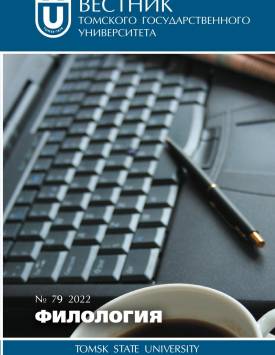Siberia’s cultural landscape in the understanding of Siberian writers and publicists of the 19th century
The aim of the study is to analyze the reflections on the Siberian literature of the leaders of the regionalism (Oblastnichestvo) movement - Grigory Potanin and Nikolai Yadrintsev, and a number of Siberian authors of the 19th century, and to prove that it was this reflection that determined the cultural landscape of Siberia, the pathos and goals of the literary process beyond the Urals. The novelty of the work lies in the fact that no attempt has previously been made to take a systematic look at the contradiction between the ideal program of regionalists (Oblastniki) and the fatal unfavorable fate of the personal and creative destinies of Siberian writers. The analysis of personal letters, public speeches, articles and memoirs of regionalist publicists shows that they were forced to place on a literary pedestal even those writers who did not meet their expectations. This process of mythologization of the fates of Siberian writers is demonstrated by the example of Yadrintsev’s works about Innokenty Omulevsky, Afanasy Shchapov, Serafim Shashkov. The main stages of their destinies, typical for educated natives of Siberia, are transformed in Yadrintsev’s articles and speeches into a passionate panegyric to the Siberian writer, deliberately dramatized and fictionalized. Such an idealized biography of the Siberian writer included a passionate love for his small homeland and the desire to return there; youthful faith in transformation; the collapse of hopes due to arrest; lack of recognition in the provincial society devoid of higher interests. The article shows that the legacy of the region-alists also demonstrates another version of the fate of the Siberian writer. It is shown on the example of the life path of Nikolai Naumov, who, having returned to Siberia, changed his career as a Petersburg writer to the position of an official for peasant affairs and subsequently could not return to literary work. A third option is considered on the example of Yadrintsev’s biography. The material of later articles and Memoirs by Potanin shows the rethinking of the regionalist “myth” about the Siberian writer. Potanin does not follow the “canon” of his colleague’s articles, building his own “plot” around Yadrintsev. An important component of it is Potanin’s confession of his guilt before the deceased comrade: in one of his last articles, Potanin declares that it was the “return to his homeland” mythologized by the regionalists that became the primary source of Yadrintsev’s troubles. The article concludes that the cultural landscape of Siberia was determined not so much by literary activity as by a discussion about the lack of proper conditions for its existence. Thanks to the regionalists, the problem of Siberian literature as a social phenomenon entered the public field. By popularizing and mythologizing the tragic fates of the natives of Siberia, the leaders of regionalism created the ground in the province for the activation of the literary process. The work of the writer was equated with a civic feat, and the tasks of literature went far beyond literary ones. The dreams of the Siberian intelligentsia about the transformative power of literature thus became an important part of the cultural landscape of the region. The author declares no conflicts of interests.
Keywords
literature of Siberia, cultural landscape, Grigory Potanin, Innokenty Omulevsky, Afanasy Shchapov, Nikolai Naumov, Nikolai YadrintsevAuthors
| Name | Organization | |
| Gnyusova Irina F. | Tomsk State University | irbor2004@mail.ru |
References

Siberia’s cultural landscape in the understanding of Siberian writers and publicists of the 19th century | Vestnik Tomskogo gosudarstvennogo universiteta. Filologiya – Tomsk State University Journal of Philology. 2022. № 79. DOI: 10.17223/19986645/79/9
